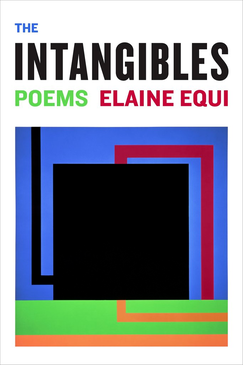The word “intangible” means “unable to be touched or grasped; not having physical presence.” Elaine Equi’s newest collection of poetry, The Intangibles, is an ode to writers and writing itself, that thing which cannot be grasped but is full of life and creativity and which all writers try to bend to their will, or else let themselves be consumed. Infusing her respect for past writers and the writerly craft, Equi’s simple, well-crafted prose brings the reader on a historical and literary journey, where the influence of and appreciation for past poets enhance the depth of her work. Many of the poems in this collection mention famous poets, such as Wallace Stevens and James Schuyler. “The Americans, Part Two” is an homage to Frank O’hara’s The Americans. “Ode to Weird” celebrates the weirdness of Emily Dickinson and Fernando Pessoa and their writing, claiming that “All poets are weird / even when their poems / try to appear normal.” In her author’s note at the end of the book, Equi explains how she drew on older poets for inspiration, saying that “Jerome in Ten” — which is written as an acrostic — was inspired by Jonathan Williams’ “Acrosticals,” and that “Larry Eigner: In His Own Words” is written entirely from lines or parts of lines from Eigner’s poems. Equi bonds with these poets and their art, and through her allusions and inspirations, Equi revitalizes the poets’ work and urges her readers to bond with them, too.
Equi doesn’t only praise the poets that have come before her; she also gives insight to her own writing. In the aptly named “Why,” Equi explains the reasons why she writes: to embellish facts, to create a body of work, to “spite an old nun,” to speak with the dead, and because “certain combinations of words really are magical.” The poems “If I Weren’t a Poet, I’d Be a Pharmacist” and “If I Weren’t a Poet, I’d Be a Bouncer” describe fantasy jobs that Equi would have if she weren’t a poet, but that ultimately lead her back to the joy and creativity of the written word, and her happiness at being a poet. This theme of writing touches almost all the poems in this collection, such as “Faces,” which is a beautiful description of watching people’s expressions change; the poet includes the lines: “speed-reading the air / a poem only she / seems aware of.” Three poems that follow one another, “The Magnificent Seven,” “For Years, I Suffered from a Strange Melody,” and “Alive with Myth” incorporate fairytale imagery and make allusions to several old tales, folklore, and pieces of history, acknowledging and celebrating the role that stories and writing play in our culture and our everyday lives. As children, we are unable to understand abstract concepts like love or time or joy; we learn about these things as we grow and experience them. In The Intangibles, Elaine Equi takes her readers on this journey, honoring with elegant prose the intangible, timeless beauty of writing. By reintroducing the world to notable poets such as James Schuyler, Frank O’Hara, and Jonathan Williams, she draws on their work to richen her own. The Intangibles is a proud celebration of writing and writers past, including Equi herself, and an invitation for others to appreciate them as well.
0 Comments
Leave a Reply. |
Archives
July 2024
Categories
All
|
|
Glassworks is a publication of Rowan University's Master of Arts in Writing 260 Victoria Street • Glassboro, New Jersey 08028 [email protected] |
All Content on this Site (c) 2024 Glassworks
|


 RSS Feed
RSS Feed
